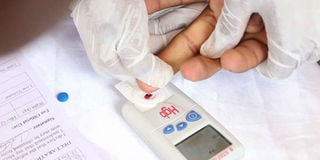In battle against HIV women must bring men along

An HIV/Aids screening test during a World Aids Day. PHOTO | NATION MEDIA GROUP
What you need to know:
- Women need men to be more interested in learning their HIV status.
- Research has also shown that women take their antiretroviral medication in a timely manner.
Four little words offered more gigantic insights about the HIV/Aids war than anything else so far in the studies conducted in recent times.
“Bring us the men,” said Dr Alberta Mirambeau from the Centers for Disease Control, citing the fact that since women have health-seeking tendencies and are mandatorily tested by hospitals when pregnant, they were easier to reach for testing than men.
She was speaking at the launch of a report titled Kenya Population-based HIV Impact Assessment 2018 by the National Aids and STI Control Programme (Nascop) last week.
MORE RIGID
This poignant phrase pointed out what is perhaps the biggest impediment to the war against HIV/Aids: that while women are becoming more adaptive, men are becoming more rigid about finding out their HIV status.
The contrast is devastating because if testing is not done, then the right interventions can’t be made and that would be like going on reverse gear.
The technocrats can crank out the statistics and levels of incidence but purely from a gender perspective. If ever there was a call to rewire how we think about HIV, then this is it.
That women bear the brunt of HIV infections — as shown by the report — has been a reality since the 1980s, when the virus started ravaging the world. Thankfully, the stigma that used to surround the disease is not as intense today as it was back then.
The Nascop report also showed that the number of women aged 20-34 years who are living with HIV is three times that of men in the same age group.
SEXUALLY ACTIVE
This is well known to be a highly sexually active group and has traditionally been the highest contributor to new infections. Women are also more biologically prone to infections, given how their reproductive organs are designed.
That is why women need men in the fight against HIV/Aids. Women need men to be more interested in learning their HIV status. Women need men to Weka Condom Mpangoni (include a condom in the plan) each time they have sex, because, no matter how sexually liberated a woman is, the choice on whether to use a condom is sometimes taken away from her by men.
A study on condom usage among youth aged 15 to 24 years by Performance Monitoring and Accountability and the International Centre for Reproductive Health Kenya in 2019 showed that 18 per cent of sexually active females reported that a partner removes a condom during sex while 35 per cent of males reported that they agree to use a condom, but remove it during sex.
SEXUALITY
Women still need to take charge of their sexuality and how they express it if they are to have a fighting chance in the HIV/Aids war, given that they are more exposed to the virus than men. It means revisiting the consent conversation each time they have sex.
It means being extra vigilant with each sexual encounter, and treating condom use as normal and a bare minimum requirement for sex.
Not doom and gloom.
It is not all doom and gloom for women, because they seem to fare very well post-infection, according to the report.
They also appear to have inbuilt resilience, probably emanating from the woman’s natural ability in picking herself up and meticulously pursuing opportunities for self-improvement.
RESILIENCE
Research has also shown that women take their antiretroviral medication in a timely manner. They end up transferring these benefits to society. It means that they can lead change.
Activist Asunta Wagura, who is a symbol of hope and resilience for HIV-positive women, having tested positive in 1988, once said that being HIV-positive is not a life-and-death situation: it’s a life-and-dare situation, because living with HIV even for a day is making history. That’s why women and men need one another in daring HIV.
Ms Oneya comments on social and gender issues, Twitter @FaithOneya, email: [email protected]





